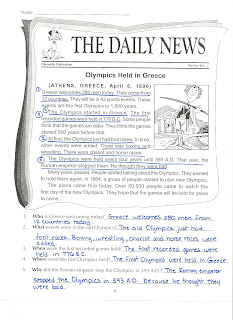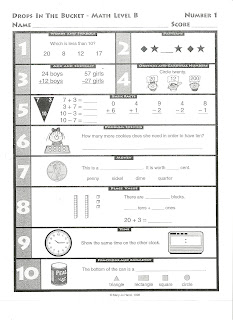Important Dates & Reminders
*I will try to highlight new dates and information with red text.
August 29, 2013 - Parent Information Night from 7:45pm till 8:30pm. The third grade team will be presenting together in Dr. Myers' Art Room, Room 126. Please note the change in time and location. You can sign up for fall conferences in the hallway.
September 2, 2013 - No School in honor of Labor Day
September 6, 2013 - Walking field trip to Thompson Park. More information will be shared during Parent Information Night. This field trip will support our life science, technology and service learning curricula. We will leave Windermere at 9:00am and return in time for lunch at 11:25. If you are available to chaperon, please email me. I would like to have at least seven adults.
September 11, 2013 - Early Dismissal for professional development at 1:15pm
October 8, 2013 - Ohio Reading Achievement Assessment (Please avoid scheduling appointments and absences on this date)
October 25, 2013 - End of the first quarter
October 28, 2013 - No school, teacher grading day
October 31, 2013 - Halloween party (extended lunch from 12pm till 1:30pm, most students go home to change into costumes)
What We Learned This Week
What a wonderful first week. I'm very fortunate to get to work with such a special group of students. Too, with only nineteen students I feel I've already gotten to know them much faster. We spent a lot of time this week establishing community routines and expectations. We will continue to reinforce these norms as the foundation for a learning community in the weeks to come. My emphasis will always be on catching students making good choices.
Word Study
I introduced syllables this week. Our understanding of syllables is that they represent one vowel sound, often made from multiple vowels. We practiced breaking multi syllabic and nonsense words into their syllables by saying the word, clapping the word and then writing the word. Students noticed that syllables ending in vowels usually make a long vowel sound (e.g. go) and syllables ending in consonants usually make short vowel sounds (e.g. can). The benefit of recognizing syllables and syllable types is twofold: decoding (reading unfamiliar words) and encoding (spelling words in our spoken vocabulary that we have not written before or have only used inventive spelling for). This requires a systematic review (and in some cases, introduction) to vowels and vowel sounds as well as consonants. We will do an intensive study of syllable types this year. I won't begin sending home spelling lists till the first week of September. These lists will represent the syllable type, vowel, or consonant spelling generalization we are studying that week. Students will be assessed with new words that represent the generalization we are studying. This will better represent their application than memorization of specific words. I'll discuss this in more depth at Parent Information Night.
Reading
I began individual reading conferences this week with an emphasis on choosing a just right book. It is important for young readers to have some choice in much of what they read to develop their interest and enjoyment of reading. However, it is equally, if not more, important that they be reading "just right books," (JRB) books they can read independently (a book they can read with 98% accuracy). What we may consider to be "easy" books are the perfect material for young readers and with access to libraries and the Internet students have access to JRB that are about their interests or are from their favorite genres.
Building reading stamina and self awareness of being a "real reader" (a committed reader that is focused and engaged) was a priority this week and we will extend our independent reading time up to an hour eventually (this will take some time). I will use this time daily to meet with individuals for reading conferences and word study intervention.
Reading homework focuses on two areas: reading non-fiction texts for information and comprehension. The first side supports students ability to read text for detail, a key skill in all future self directed learning. The back, optional this week, supports students ability to recall, synthesize and deeply comprehend what they are reading, all higher order reading skills. The back will not be optional beginning next week. Students, and families, desiring additional reading homework should encourage their student to read aloud nightly for approximately 20 to 30 minutes. Again, choosing a JRB is key.
Our first read aloud is Crispin: The Cross of Lead, by Avi. We will read several Avi books representing a timeline of events from the Middle Ages till the 1940's. This historical span will support our social studies curriculum, specifically understanding changes in communities over time. We will also leverage Avi to study the author's craft as students will recognize reoccurring themes and techniques. If you'd like to read more about Avi, his website is http://www.avi-writer.com/index.html. A summary of Crispin is available at http://www.avi-writer.com/books/books/crispincross.html.
Our first read aloud.
Students are encouraged to ask questions to support their comprehension.
Writing
We recorded our first writing sample of the year by writing a personal narrative about an experience from the summer. I was very pleased with most students' content. These writings serve me in getting to know the class as writers and will provide an inspiration as we look back to them to see our growth as writers. Convention is always a focus in third grade. We began working on complete sentences and will work towards mastery before moving on to the writing process, paragraphs and multi-paragraphs. Complete sentences must:
- Begin with a capital letter.
- End with a punctuation.
- Contain (or an implied) who (noun, subject).
- Contain a what (verb, predicate).
Students wrote their own sentences and we examined them for the above requirements.
Math
Numeracy will be our focus for the first month of school. I will engage students who have mastered this with problem solving, math games and Number Talks (I plan to share more about this mental math development program). This week, we studied place and value, patterns, standard notation, expanded notation and naming numbers.
34,506
standard notation
30,000
4,000
500
00
6
expanded notation
Below students are lined up, each one with a value in a place from ones to one-hundred thousands. They must offer two names. For example a student who had written 2 an was standing in the tens place would say, "twenty or two tens." This is far more complex than we might expect. Click on the video to see students in action.
Click on the video to see students in action.
Below students are playing Biggest Number, a game where they take turns rolling a ten sided die and determining where they should record their roll (in one of the 6 possible places up to the hundred thousands). Students learn to leave higher places open for higher values and to record low values in low places. Students then read their numbers to each other at the end of each game, practicing this important skill. Students who struggle with reading large numbers are encouraged to "read three numbers (between the commas) just as you would read any number up the hundreds place and then give it a last name (thousands, represented by the comma) of thousand." Most third graders are comfortable reading numbers up to the hundreds and this makes this skill less overwhelming when reading numbers up to one-hundred thousands.
We studied the repeating pattern of ones, tens, hundreds, one-thousands, ten-thousands, hundred-thousands.
Science
I enjoy beginning the year with a science experience. I find science to be a great opportunity for students to fully engage in their learning. As it is hands on and experiential, it allows all students to fully participate and develop a love for learning regardless of possible literacy challenges. We pulled all three third grade classes to introduce our physical science of force and motion. We also explored solids, liquids and gases as we added water to Alka-Seltzer to create a gas. We then went outside to launch or film canister rockets. On Tuesday, we had very little success (The bag of Alka-Seltzer had apparently gotten enough moisture in it to release the gas, but it maintained is solid state, thus it did not create enough gas to launch our rockets by building up sufficient pressure to pop the lids off.). This provided us with a wonderful learning opportunity to hypothesize, based on what we expected to happen, why the rockets failed. Having predicted the cause as a group, we tried fresh Alka-Seltzer the following day with much success. We also used a leaf blower to demonstrate Bernoulli's principle, that when air flows around an object (like an airplane wing) it speeds up creating an area of low pressure. We were able to suspend a ball over the flow of air because of the high pressure below and on the sides as gravity pushed down. We will expand on this unit in the spring.
To see Bernoulli's principle demonstrated, click on the following link: http://science.discovery.com/tv-shows/head-rush/videos/head-rush-leaf-blower-ball.htm
We also planted our classroom garden of carrots, chamomile, spearmint, oregano and basil. In conjunction with our Social Studies study of the feudal and agrarian systems of the Middle Ages, we planted like our early ancestors. We will observe changes and compare and contrast the plants we grow until we can collect them and celebrate our garden with a small meal featuring our harvest. We watched a short brainpop video on seed plants.
Social Studies
We began studying the Middle Ages, specifically the feudal system to see an earlier and contrasting form of self government from our democratic system. I will elaborate on this as the year progresses and we study other forms of government through Avi's books and our government unit on the three branches and local government.































